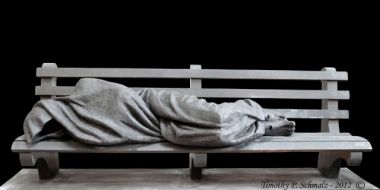The Good Atheist: Why Christians don't have a monopoly on charity

We really like it when Christians do good things. Street Pastors, that's good. Foodbanks – brilliant. Debt counselling, soup kitchens, homeless charities – give those Christians a pat on the back.
But one of the things that really bugs non-Christians is our claim that we do these things because we're Christians. The trouble is that this implies that if we weren't Christians we wouldn't do them. It also implies that non-Christians are less likely to do them, so we're just better than they are.
Why can't people just do good things because they want to help people? Why drag religion into it?
Here are five things to think about when we're trying to be good advertisements for the gospel.
1. We don't have a monopoly on goodness. Theologians talk about 'common grace', as opposed to 'special grace'. Common grace is what everyone has because God is good. That includes the instincts of kindness, sympathy and self-sacrifice. You don't need to be a believer to show these qualities. In fact, Jesus warns that religion can actually stop you from showing them. In the parable of the Good Samaritan (Luke 10:25-37), the reason the priest and the Levite don't stop to help the man by the side of the road is that he might be dead, and if they touched him they'd be ritually unclean – the classic example of religion getting in the way of goodness.
2. We should be wary of self-promotion. Yes, we want people to know about Jesus, but telling people about our work at the homeless shelter ("It's run by a church! See how great the church is!") can sound too much as though we have an agenda. We should help people because they need it, not because it makes us look good, either as individuals or as a church. Jesus said: " Be careful not to practise your righteousness in front of others to be seen by them. If you do, you will have no reward from your Father in heaven. So when you give to the needy, do not announce it with trumpets, as the hypocrites do in the synagogues and on the streets, to be honoured by others. Truly I tell you, they have received their reward in full" (Matthew 6:1-2).
3. Sometimes being a Christian really does make us better people. You'd hope so, wouldn't you? But here's the thing: I know that some people who don't happen to believe are naturally better, kinder and nicer than me. But being a Christian means that I know that I'm not as good as I could be, so I try to do better. I do things that I don't want to do, because I think I should. It doesn't mean I'm better than other people, it means I'm better than I would have been if I weren't a Christian. It's like running, which I do a couple of times a week. I don't try to compare myself with other people, but I'm happy if I can get a bit faster as the weeks go by.
4. Churches can be really good at doing stuff. That's because they're organised and full of people who believe that they ought to be changing the world for the better. A survey published in 2013 found that volunteers in UK churches put in 98 million hours on social action initiatives, contributing an estimated £2.5 billion in time, money and facilities. The philosopher Edmund Burke said: "To love the little platoon we belong to in society, is the first principle...of public affections. It is the first link in the series by which we proceed toward a love to our country and to mankind." Churches work because they're good at being communities.
5. We should be happy in a big tent. One reason why Christians are good at the social action stuff is that we're all in it together and we share the same assumptions about why we're doing it. But we shouldn't worry about working with non-Christian groups or individuals. We're not about empire-building, we're about Kingdom-building. Jesus said, "Whoever is not with me is against me" (Matthew 12:30). But he also said, "Whoever is not against us is for us" (Mark 9:40). In the context of helping other people to live better, fuller and richer lives, we should aim for a little more Mark and a little less Matthew.
Follow @RevMarkWoods on Twitter.











